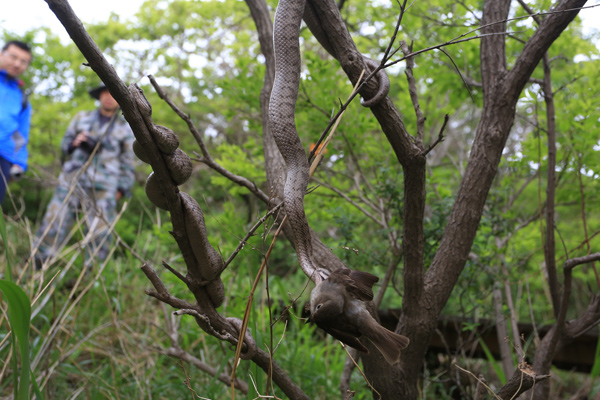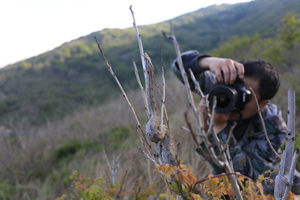Researcher spends 16 years studying snake
 |
|
A Shedao pit viper catches a bird on the island of Shedao at the Liaoning Snake Island-Laotie Hill National Nature Reserve.ZHANG CHUNLEI/CHINA DAILY |
Shedao island covers just 0.73 square kilometers, but is home to tens of thousands of one particular type of serpent
Would you be afraid of living alone on a small island with nearly 20,000 snakes?
"There is nothing to be scared of," said Wang Xiaoping, a researcher with the administrative bureau at the Liaoning Snake Island-Laotie Hill National Nature Reserve.
Since he graduated in 2001, Wang has been conducting research on the Shedao pit viper, a poisonous snake found on the island of Shedao in Liaoning province, which is known as Snake Island.
He once spent 30 consecutive days on the island, and the most time he has spent there in a single year is a total of 160 days.
"Many Chinese people seem to have an irrational fear of snakes," he said. "When I first visited the island, I covered myself from head to toe, but now I rarely wear gloves or boots."
Wang, who has been studying the Shedao pit viper for 16 years, knows his subject well.
On the island, each snake usually eats about one or two small birds a year, while in order to save energy, they seldom move, Wang said, adding that they wrap themselves around tree branches or hide in the grass waiting for birds.
Located off the southernmost tip of the Liaodong Peninsula in Liaoning, Snake Island, which is about 10 kilometers from the Chinese mainland and covers an area of just 0.73 square km, was named a World Biosphere Reserve by UNESCO in 2013.
Wang always wears a camouflage hat on the island because on his first visit he was bitten on his head by a snake.
"As far as we knew, being bitten on the arms or legs was not life-threatening, but we had no idea about the head. I was frightened and rushed to receive first aid," Wang said.
Fortunately, he was not badly affected by the bite, but he was not so lucky the second time around.
During a survey in May 2007, Wang and his colleagues were catching snakes using a long iron rod and then holding them behind the head with thumb and forefinger.



















